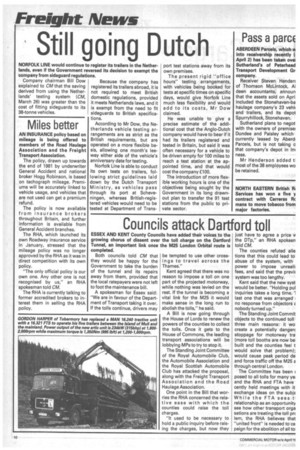Fre.i.41.st. News._ . . . ... .
Page 12

If you've noticed an error in this article please click here to report it so we can fix it.
Still going Dutch
NORFOLK LINE would continue to register its trailers in the Netherlands, even if the Government reversed its decision to exempt the company from sideguard regulations.
Company chairman Bill Dow explained to CM that the saving derived from using the Netherlands' testing system (CM, March 26) was greater than the cost of fitting sideguards to its 38-tonne vehicles. Because the company has registered its trailers abroad, it is not required to meet British domestic regulations, provided it meets Netherlands laws, and it is exempt from the need to fit sideguards to British specifications.
According to Mr Dow, the Netherlands vehicle testing arrangements are as strict as the British requirements, but are operated on a more flexible basis, allowing one month's leeway either side of the vehicle's anniversary date for testing.
Norfolk Line is able to conduct its own tests on trailers, following strict guidelines laid down by the Dutch Transport Ministry, as vehicles pass through its port at Scheveningen, whereas British-registered vehicles would need to be tested at Department of Trans port test stations away from its own premises.
The present rigid "office hours" testing arrangements, with vehicles being booked for tests at specific times on specific days, would give Norfolk Line much less flexibility and would add to its costs, Mr Dow claimed.
He was unable to give a precise estimate of the additional cost that the Anglo-Dutch company would have to bear if it had its trailers registered and tested in Britain, but said it was often necessary for a vehicle to be driven empty for 100 miles to reach a test station at the appointed time, and that would cost the company £100.
The introduction of more flexible working hours is one of the objectives being sought by the Government in its long drawnout plan to transfer the 91 test stations from the public to private sector.




















































































